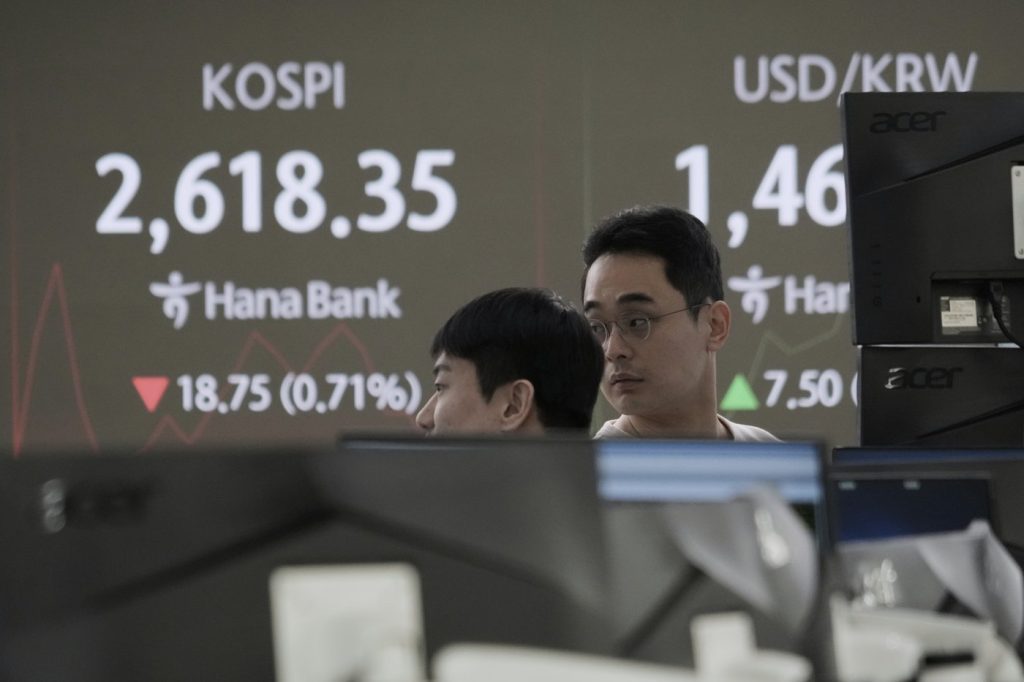Asian shares exhibited mixed performance on Friday as investors reacted to the decline of Wall Street, which was influenced by uncertainties stemming from U.S. President Donald Trump. U.S. futures remained relatively unchanged, while oil prices saw a slight increase.
In the Chinese markets, trading saw declines for the second consecutive day. Hong Kong's Hang Seng Index plummeted by 2% to close at 23,733.02 following the decision to maintain key lending rates in China. As a result, traders began unloading technology shares after a recent period of gains. Similarly, the Shanghai Composite Index experienced a decline of 0.9%, finishing at 3,376.96.
Conversely, the Japanese market had a more favorable outcome. The Nikkei 225 rose by 0.5% to reach 37,933.13 as trading resumed after a holiday on Thursday. Japan's core inflation rate fell less than expected, an outcome partially attributed to a surge in rice prices prompted by supply shortages. Other Asian markets also saw gains, with Korea's Kospi inching up by 0.1% to 2,643.59, and Australia’s S&P/ASX 200 climbing 0.4% to 7,947.30. Meanwhile, Bangkok's SET gained 0.5%, while the Taiex in Taiwan dropped by 0.4%.
On the previous day, the U.S. stock market experienced a slight decline, with the S&P 500 falling by 0.2% to 5,662.89, and the Dow Jones Industrial Average dipping less than 0.1% to 41,953.32. The Nasdaq Composite decreased by 0.3% to settle at 17,691.63. This volatility in Wall Street's performance has persisted for weeks, as stock prices have fluctuated significantly based on uncertainties related to Trump's trade policies and their potential economic impact.
Recent data releases have supported the idea that the economy remains solid enough to maintain interest rates. One report indicated that the number of U.S. workers filing for unemployment benefits was lower than economists had anticipated. Additionally, stronger-than-expected sales of previously occupied homes were reported, along with better-than-forecast manufacturing growth in the mid-Atlantic region.
Federal Reserve Chair Jerome Powell emphasized the high level of uncertainty prevailing in the market, which complicates predictions for future economic conditions. This uncertainty is not only related to the ongoing trade conflict but also to the potential repercussions of actions aimed at reducing federal spending in the U.S. The broad U.S. stock market's drop, which has seen it fall over 10% from its all-time high in a matter of weeks, appears to have been an adjustment after prices previously rose much faster than corporate profits.
On Wall Street, Darden Restaurants reported a notable increase of 5.8% after fulfilling analysts’ profit expectations for the most recent quarter, despite describing the business environment as “challenging.” Conversely, Accenture experienced a more significant decline as concerns grew regarding the anticipated impact of reduced revenue from U.S. government contracts on its business. Accenture's stock fell by 7.3%, despite reporting slightly better-than-expected profit and revenue for the latest quarter.
In terms of other market activities, Britain's FTSE 100 index saw a slight decrease of 0.1% after the Bank of England opted to keep its main interest rate unchanged. In early trading on Friday, U.S. benchmark crude oil prices increased by 31 cents to $68.38 per barrel on the New York Mercantile Exchange. Brent crude, the global standard, rose by 27 cents to $72.27 per barrel.
The currency market also witnessed some fluctuations, with the U.S. dollar rising to 149.40 Japanese yen from 148.78 yen, while the euro fell to $1.0831 from $1.0854. Overall, the Asian markets were mixed as they responded to external influences and developments in economic data.










